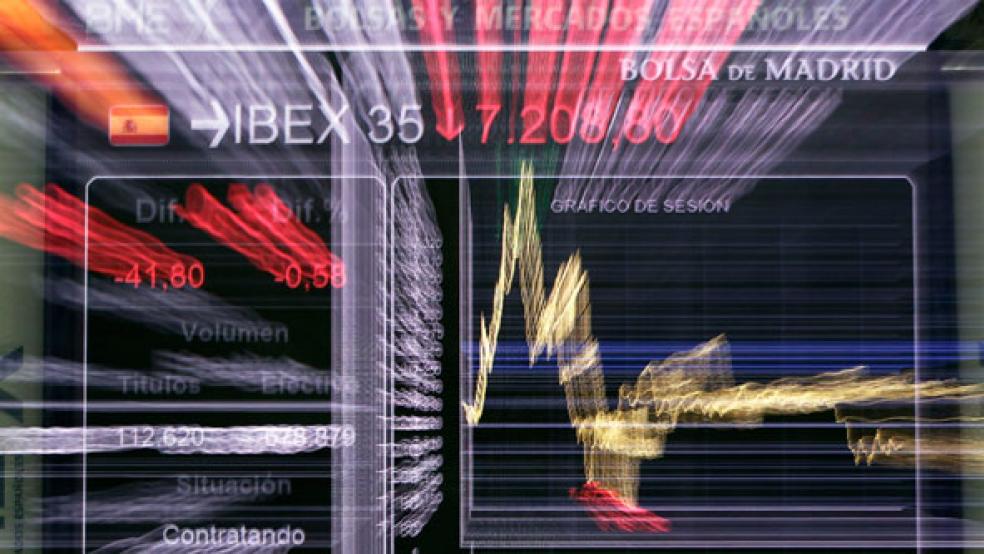With less than a week left before Greek citizens cast their ballots in the second batch of national elections held this year, the tension surrounding the outcome of the voting is growing. In essence, the ballot is a straightforward poll on whether Greece will remain part of the Eurozone, with the Syriza party arguing that if the price of membership in the single currency community is draconian austerity measures, then the answer is “no.”
Given the uncertainty surrounding the outcome, with Syriza running neck-and-neck with Pasok – the center-right party that views keeping to the terms of the bailout agreement as the lesser of two evils – it’s hardly surprising that EU policymakers this weekend moved to contain any further damage in the country that is clearly the next domino: Spain.
Leaders in Madrid finally gave up on efforts to save their own banking system from collapse, and threw themselves on the mercy of the 17-member Eurozone, seeking an international bailout. The result – the product of an emergency conference call meeting – is a bailout package for Spanish banks that could be worth as much as €100 billion ($125 billion). That makes Spain the fourth Eurozone economy to have received a bailout in recent years (following Greece, Ireland and Portugal) – and by far the largest.
Until now, Spain had tried to avoid a Eurozone bailout and restructure its banks using its own resources. But as the new Greek election loomed large on the horizon, and financial markets became far more turbulent, it was clear that their efforts were in vain. The country’s housing market meltdown has left Spanish financial institutions grappling with what some have calculated to be as much as €175 billion in problematic real estate lending.
RELATED: Spain Cuts a Deal: How Short Is the Leash?
The banks, for their part, were unable or unwilling to make provisions to cover those problem loans, fearing that they would put a hole in their balance sheets that they wouldn’t be able to repair by raising new capital. Last month, Spanish politicians sought to take the decision out of their hands, by insisting that they set aside an additional €30 billion to provide against losses in still-sound loans on their books, raise new capital and put their problem loans into special purpose vehicles in which they can be held until they can be disposed of – somehow.
Even then, the market was skeptical. Late last month, Spanish government bond yields spiked higher, coming close to the 7 percent threshold that marked the level at which yields on Portuguese and Irish bonds traded before those nations sought their own bailouts. At home, key players didn’t prove helpful. The governor of the Bank of Spain, Miguel Angel Fernandez Ordonez, announced his resignation a month ahead of the expiry of his term, and exited blasting his critics and debating the cost and feasibility of a bailout of BFA-Bankia. That raised new fears of how the Spanish government will go about recapitalizing Bankia, which in late May asked for €19 billion of new funds from the Spanish government.
The bailout – which Spanish Prime Minister Mariano Rajoy said was at his request, not at the demand of fellow European leaders – will at least solve that short-term problem. But it’s no panacea: Spain’s economy remains very troubled: It is in recession once more, with an unemployment rate running at a Eurozone high of around 25 percent and nearly half of all those under the age of 25 without a job.
The good news is that Europe’s leaders didn’t wait until after June 17 and the Greek election results to take steps to bolster the Spanish banks. Further postponing what seemed increasingly inevitable would have only increased the risk that they wouldn’t be able to cobble together an agreement or that the cost of such a bailout would prove unsustainable. As it is, they have erected a system of levees that should mean that any storm unleashed by the Greek elections won’t sweep away Spain’s banks and take with them the country’s economic and political infrastructure.
But while the first test of these new storm walls next week likely will be the biggest and most significant, it won’t be the last – and any protective wall can be damaged by smaller attempts to breach it over the course of months or years. And that’s the bad news: This is yet another Band-Aid solution by European leaders; an attempt to address one small part of what has evolved into a systemic crisis and the biggest challenge to the global economy since the Great Depression of the 1930s. On its own, this latest bailout will simply delay the inevitable by a few months.
George Osborne, Britain’s chancellor of the Exchequer, said in an interview with the Sunday Telegraph that the Eurozone has reached “a moment of truth.” For once, those words don’t sound like the clichés trotted out for public consumption by a too-glib politician, but a simple statement of fact. In the absence of a clear set of long-term strategies that can be supported by all – from anti-austerity campaigners in Greece to bailout opponents in Germany – it’s evident that the “European experiment” of a single currency will fail. The Spanish bailout buys the region’s leaders some time to ponder their next move – but not much of it.






